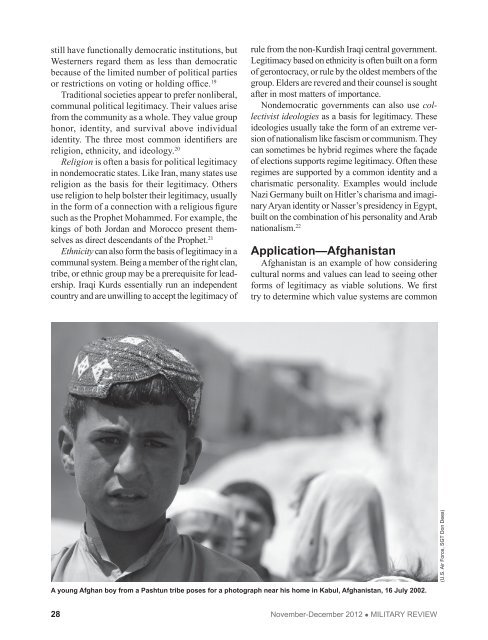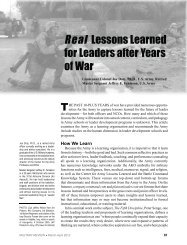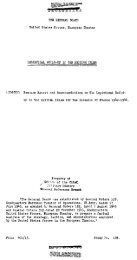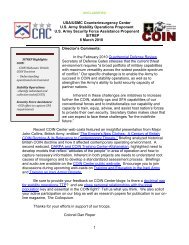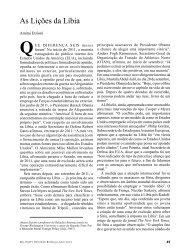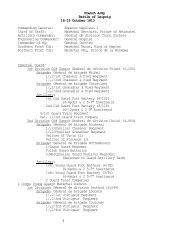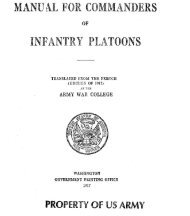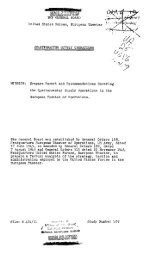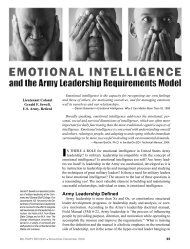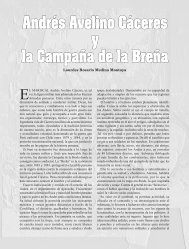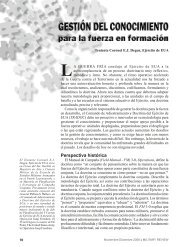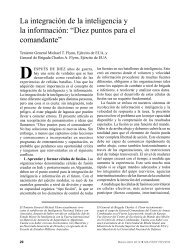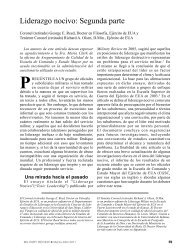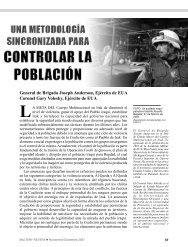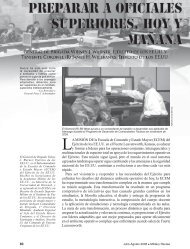military - US Army Combined Arms Center and Fort Leavenworth
military - US Army Combined Arms Center and Fort Leavenworth
military - US Army Combined Arms Center and Fort Leavenworth
You also want an ePaper? Increase the reach of your titles
YUMPU automatically turns print PDFs into web optimized ePapers that Google loves.
still have functionally democratic institutions, but<br />
Westerners regard them as less than democratic<br />
because of the limited number of political parties<br />
or restrictions on voting or holding office. 19<br />
Traditional societies appear to prefer nonliberal,<br />
communal political legitimacy. Their values arise<br />
from the community as a whole. They value group<br />
honor, identity, <strong>and</strong> survival above individual<br />
identity. The three most common identifiers are<br />
religion, ethnicity, <strong>and</strong> ideology. 20<br />
Religion is often a basis for political legitimacy<br />
in nondemocratic states. Like Iran, many states use<br />
religion as the basis for their legitimacy. Others<br />
use religion to help bolster their legitimacy, usually<br />
in the form of a connection with a religious figure<br />
such as the Prophet Mohammed. For example, the<br />
kings of both Jordan <strong>and</strong> Morocco present themselves<br />
as direct descendants of the Prophet. 21<br />
Ethnicity can also form the basis of legitimacy in a<br />
communal system. Being a member of the right clan,<br />
tribe, or ethnic group may be a prerequisite for leadership.<br />
Iraqi Kurds essentially run an independent<br />
country <strong>and</strong> are unwilling to accept the legitimacy of<br />
rule from the non-Kurdish Iraqi central government.<br />
Legitimacy based on ethnicity is often built on a form<br />
of gerontocracy, or rule by the oldest members of the<br />
group. Elders are revered <strong>and</strong> their counsel is sought<br />
after in most matters of importance.<br />
Nondemocratic governments can also use collectivist<br />
ideologies as a basis for legitimacy. These<br />
ideologies usually take the form of an extreme version<br />
of nationalism like fascism or communism. They<br />
can sometimes be hybrid regimes where the façade<br />
of elections supports regime legitimacy. Often these<br />
regimes are supported by a common identity <strong>and</strong> a<br />
charismatic personality. Examples would include<br />
Nazi Germany built on Hitler’s charisma <strong>and</strong> imaginary<br />
Aryan identity or Nasser’s presidency in Egypt,<br />
built on the combination of his personality <strong>and</strong> Arab<br />
nationalism. 22<br />
Application—Afghanistan<br />
Afghanistan is an example of how considering<br />
cultural norms <strong>and</strong> values can lead to seeing other<br />
forms of legitimacy as viable solutions. We first<br />
try to determine which value systems are common<br />
A young Afghan boy from a Pashtun tribe poses for a photograph near his home in Kabul, Afghanistan, 16 July 2002.<br />
28 November-December 2012 � MILITARY REVIEW<br />
(U.S. Air Force, SGT Don Dees)


